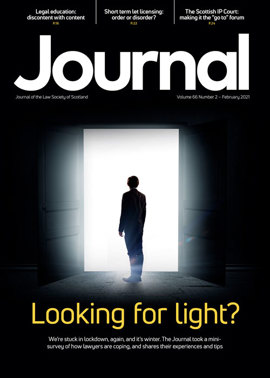Criminal court: Discount season
Claim your sentence discount!
The jurisprudential output of the Sheriff Appeal Court is not large. I am not sure of their workload these days and can understand their reticence to publish an opinion which does little more than state the obvious. However, over the years summary appeal decisions have formed the cornerstones of Scots criminal law: e.g. Williamson v Wither 1981 SCCR 214, which sets the Scottish standard on “no case to answer”, as opposed to the more qualitative English approach.
Recently there was a flurry of activity by the court in Hendry v Procurator Fiscal, Elgin [2020] SAC 008 (17 November 2020) and Grant v Procurator Fiscal, Elgin [2020] SAC 009 (18 November 2020). Both opinions quote from Boyd v Procurator Fiscal, Inverness [2020] SAC (Crim) 7, decided on 7 October 2020 but only published (following representations) on 27 January 2021.
 All three are drink-driving cases where guilty pleas were tendered at the outset and appeals were taken not against the headline sentences but against the discount selected by the sheriff, which was less than a third.
All three are drink-driving cases where guilty pleas were tendered at the outset and appeals were taken not against the headline sentences but against the discount selected by the sheriff, which was less than a third.
Hendry was found to have a breath alcohol reading of 63 micrograms. He had a similar conviction in 2015, so attracted the enhanced disqualification period of three years.
The sheriff imposed a community payback order of 200 hours, discounted by 25% to 150 hours, and 54 months’ disqualification discounted by the same factor. Since the opinion does not disclose the disqualification, I leave you to do the maths.
The sheriff’s view was that the early plea was of limited utilitarian value, as it appeared to be a straightforward two police witness case with no defence, and any trial would have been unlikely to last more than 30 minutes. She allowed the appellant the opportunity to participate in the drink-driving rehabilitation programme, but restricted to 10% the reduction of disqualification on successful completion: a discount of up to 25% can be given.
Grant was a 69-year-old first offender who pled guilty to a complaint containing two drink-driving charges committed 12 days apart, with readings of 108 and 75 micrograms respectively. It follows that he was processed after the first offence and committed the second one before making an early court appearance.
Headline sentences of a cumulo fine of £3,000 and 48 months’ disqualification were selected. The sheriff considered a 15% discount appropriate, once again indicating the limited utilitarian value of the plea given the nature of the offending and there being no civilian witnesses. Similarly a 10% reduction was granted in the event of successful completion of a rehabilitation course.
Boyd, with a breath reading of 63 micrograms, also had a relevant previous conviction. His fine was correctly discounted from £1,500 to £1,000, but no discount was given to a four-year disqualification and only a sixth was given in relation to successfully completing the rehabilitation course.
In Hendry and Grant the Appeal Court granted discounts of one third to the sentences. Hendry’s sentence became 130 hours’ unpaid work and three years’ disqualification. While this is the minimum period for a repeat offence, the court certified the appellant as suitable in the absence of special reasons for a reduction of one quarter, leaving 27 months to serve, on successful completion of the course.
Grant’s appeal was dealt with in the same way, resulting in a total fine of £2,000 for the offences and three years’ disqualification, with nine months’ reduction on successful completion of the course. In Boyd the SAC fully supported the underlying purpose of this rehabilitative initiative, concluding: “As a one quarter discount is available, we would expect any lesser discount, in ordinary circumstances, to require some justification.”
Boyd’s disqualification was discounted from four years to three, the legal minimum, but he was afforded a discount of a quarter (nine months) if he successfully completed the course. The sheriff had regarded both the alcohol reading and length of journey taken as being aggravators, but the court considered they indicated a “heightened benefit in such a driving course that a lesser reward for doing so is counterproductive”.
The court noted that in Gemmell v HM Advocate 2012 JC 212, while a reduction of one third on pleading at the first calling was not an entitlement, practitioners should be able to give advice to clients with a degree of confidence about the likely discount. It also referenced Wilson v Procurator Fiscal, Aberdeen [2018] HCJAC 50 (Journal, October 2018, 28), where the Criminal Appeal Court said discounts should be of the same level for all punitive aspects of the sentence.
In the present climate, with backlogs, delays and adjournments, those accused who wish to face up to their case and have it dealt with at the outset should be properly rewarded for the utilitarian value of such pleas with the full advertised discounts.
Dodgy libels
In HM Advocate v Turner [2020] HCJ 12 (17 January 2020; published 9 December), Lord Turnbull wrote at some length when dealing with an objection to the charge at a preliminary hearing. His opinion is in emphatic terms about the irrelevant inclusion of a charge of attempting to pervert the course of justice as a consequence of the appellant stating a defence to the principal charge.
The accused had been driving on a motorway when his vehicle left the carriageway, travelled down an embankment and overturned, killing two passengers. He was relatively unscathed, but confused, shocked and hypothermic. He told rescuers a deer had run on to the road and he had swerved to avoid it. He repeated this when cautioned. This evidence was said to be inconsistent with the Crown information, hence the inclusion of the charge in addition to contravention of s 1 of the Road Traffic Act 1988 (causing death by dangerous driving).
His Lordship held that the course of justice had not begun until police spoke to the accused, so references to earlier remarks to civilians had to be excised from the charge. He also rejected the Crown’s contention that there was something “so stark” about the accused’s conduct at the crash site that distinguished it from allegations of sexual assault when an account of consensual sexual activity is given by way of response by the suspect.
Lord Turnbull considered the present charge represented a change of practice by the Crown. He was left with the impression that the decision to include it on the libel “may ;not, in fact, have been the product of mature consideration”.
While giving false information to lead the Crown away from the culprit by, for example giving a false name, is an attempt to defeat justice, stating a defence which may later prove unfounded does not amount to interference with the course of justice. Accordingly the second charge was held irrelevant and deleted from the indictment.
Culpable homicide not reckless
Ditchburn v HM Advocate [2020] HCJAC 55 (29 January 2020, published 17 December) is an example of the tragic circumstances which can arise out of a “small argument”. The appellant’s position was that the deceased started picking on a third party and he had intervened and punched him on the jaw. Other evidence described the blow as a “wee slap”. All three men sat down and subsequently the deceased slumped off his seat and fell to the floor. There was no apparent injury but he was seen to be bleeding from the mouth. Medical evidence highlighted complications of blunt force mouth trauma which were just one element in a multi-factorial death.
At trial self-defence was pled, in normal form. The judge directed the jury that to convict of culpable homicide they would need to be satisfied the accused’s actions were intentional or reckless or grossly careless. It was conceded that the reference to recklessness was inappropriate and potentially apt to confuse. The Appeal Court held there had been a miscarriage of justice, quashed the conviction and ordered a retrial.
(The accused was reindicted but in the event pled guilty and was sentenced to six years’ imprisonment. He had a lengthy record for violence, and had not sought immediate medical help for his victim, who was not in good health, was substantially intoxicated and had been bleeding heavily.)
Five judges on s 275
I decided to spare regular readers another instalment in the Criminal Procedure (Scotland) Act 1995, s 275 saga in my December article. I had other cases to report, but I was also concerned that the appeal was reported in some detail before trial, anonymised but referring to “[an address in Fife]” as the locus. I now understand that trial took place in January 2021, when the appellant was convicted.
The circumstances in CH v HM Advocate [2020] HCJAC 43 (13 October 2020) are that the appellant and complainer were introduced by the complainer’s friend, witness A, during July 2017. They became Facebook friends, communicating for about a week until they arranged a night out including A. The appellant’s position in the s 275 application was that on the night in question he picked the complainer up and drove her to the locus, where he twice had consensual intercourse with her. They then met A and went on the night out, during which time the women drank alcohol but the appellant did not as he was driving. Afterwards the complainer and appellant returned to the locus where the complainer “came on to him” because she had been drinking and was behaving in a disinhibited manner. The appellant stated he refused to engage in sexual activity as he had an aversion to the smell of alcohol. The complainer was annoyed and frustrated at this. However he averred the following morning they had consensual sexual intercourse.
At a preliminary hearing the judge granted the application but only to the extent that the couple had gone on a night out. He did not regard the information that consensual intercourse had occurred earlier in the evening or the morning afterwards as relevant. The libel was one of tying up the complainer and repeatedly raping her when she was intoxicated. On appeal the court was critical of the note of appeal for failing to specify any ground of appeal or legal propositions. The note simply asserted that the appellant should be allowed to give his version in full since he would be covering a 48-hour period of events. If this was not allowed, his evidence would be disjointed and have gaps which would ”adversely impact on his credibility”. It was submitted that the evidence of sexual activity not referred to in the charge was so closely related to the alleged offence in time, place and character that it was not collateral.
Oliver v HM Advocate [2019] HCJAC 93 was authority that the court could consider sexual activity within “a period of hours, or perhaps a day or two, following an alleged event”. The Crown conceded that while sexual behaviour in the aftermath of an alleged incident was likely to be irrelevant, one could not say that it would never be relevant.
The court reiterated that the evidence sought to be elicited must be admissible at common law and it was not simply a question of a general exercise of discretion in the interests of fairness. Whether a fact is relevant depends very much on its context and the degree of connection between what is sought to be proved, or disproved, and the facts libelled.
As regards collateral matters, reference was made to Lord Ross in Brady v HM Advocate 1986 JC 68 at 73: “The existence of a collateral fact does not render more probable the existence of the fact in issue… a jury may become confused by having... their attention diverted from the true matter in issue.”
The court noted the tension between the period after the event referred to in Oliver, and Lee Thomson, High Court, 13 December 2019, unreported, where the court approved the preliminary hearing judge’s rationale that “the fact that a person may have consented to sexual activity on one occasion has no bearing at all on whether they consented on another occasion, either before or after the incident in question, save possibly, in particular circumstances, in the immediate aftermath”.
It also noted that, in contrast to Oliver, no special defence of consent was lodged and the appellant’s position was that the events libelled in the indictment had not taken place. The Crown’s position was that the other acts of intercourse averred were disputed as not having taken place either and the appellant was seeking to introduce other matters of dispute, which must render them collateral.
The appeal was refused as the evidence sought to be led was not admissible at common law, being collateral. Even if admissible it would be prohibited by statute and could not be brought within any of the permitted exceptions.
Lord Menzies, who had delivered the opinion of the court in Oliver, was part of the bench in the present case and in concurring, said that Oliver was not authority for the proposition that any evidence of events occurring within the immediate aftermath would be relevant. There was no hard edged rule, as cases were fact specific, and “‘the immediate aftermath’ should be reckoned in hours, not days”.
Shield legislation designed to protect the privacy and dignity of complainers has been in force in some form since 1985, and crucially as respects s 275, largely in its present form since 2002. After a sticky start, judicial attitudes have become more robust. CH is a rather laborious 65-page decision, but it is worth being aware of the principles and limited scope of s 275 applications. The door has been left ever so slightly ajar, as there is a danger that if all context is removed from the libel, the evidence adduced could appear to have an artificiality about it which jurors might find puzzling.
Practitioners have to present clear and specific applications if they are to have any prospects of success within the restrictions imposed by statute.
Regulars
Perspectives
Features
Briefings
- Criminal court: Discount season
- Family: Capital values in uncertain times
- Employment: Can employers require staff vaccination?
- Human rights: Protecting the child claimant
- Pensions: a bill with teeth
- Charities: commerce as public benefit?
- Property: Playing safe: on the right track?
- In-house: Wide world of in-house
In practice
- Priorities for our Parliament
- The Word of Gold: The gift that keeps on giving
- TRS: more trusts, more information, more access
- A proper conclusion
- The Eternal Optimist: Putting resolve into resolutions
- Appreciation: Professor Emeritus Robert Rennie
- Ask Ash: Trainee in a rut
- Royal Faculty invites new members







